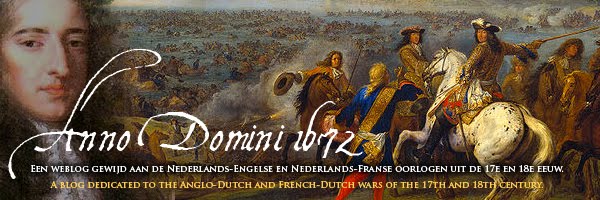
Op de leestafel het boek Het Regiment Huzaren Prins Alexander van (Lt-Col. bd) Arie Rens, een van de weinige regimentsgeschiedenissen die in boekvorm zijn verschenen, uitgegeven bij de Management Press, ISBN 9055230081.
Tot mijn grote vreugde komt de periode voor de tweede wereld-oorlog er nu eens niet bekaaid af, sterker nog het boek bevat zelfs informatie over de periode rond 1672, zoals de eerste afbeelding in Nederland van de hertog van Coerland, die een regiment aanvoerde wat een stamregiment is van het Regiment Huzaren. (Regiment Garde Dragonders, opgericht 1672, link) Wel wat bescheiden informatie over de slag bij de Boyne, daar zat gewoon veel meer in, zeker als ik lees dat mr Frans Besier onderzoek had gedaan naar de 17e eeuwse geschiedenis van de diverse stamregimenten.
Rens heeft overigens een erg leesbaar boek geschreven met mooie iullustraties.

On the reading table a book on the Dutch Hussar Regiment Prins Alexander, which can date it's regimental history back to the year 1672, when a commission was granted to the Duke of Courland (present day Latvia) to raise a regiment of Dragoons, which became the Garde Dragoons. This regiment took part in battles like Seneffe and St-Denis. A list of commanders and other battles can be found here.
With great pleasure I read a book that wasn't committed to WW2 only. Though info on the 1672 period is scarce, this book published the first picture in a dutch publication of the Prince of Courland, it has some info on the Battle of the Boyne ans some pics of the 1750's. Well written, nice illustrations and easy to get second hand. The author has been one of the commanders of the regiment.




Probably a great and interesting book, bad for me that is in nederlands...
BeantwoordenVerwijderenRegards
Regimental histories are almost non-existant, and if they are they are mostly about the second world war. I dont mind translating, but whole books...a bit of a bridge too far.
BeantwoordenVerwijderenNice detail about this regiment is that is was in English service and pay between 1688 and 1698, only to be returned to Holland after English parliament declared that the English army was to consist of English only. In English literature it is referred to as Eppinger's Dragoons, after its colonel-commandant, whereas the prince was of course the colonel-proprietor.
BeantwoordenVerwijderen